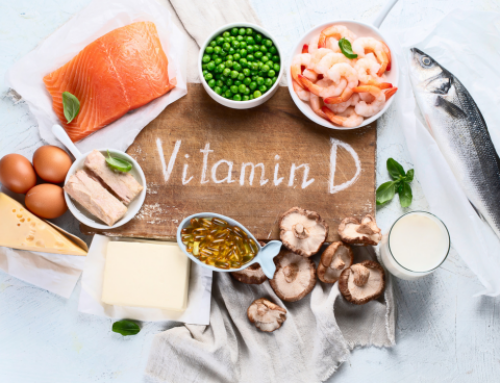6 Vitamins and Minerals Every Athlete Needs to Know
Carbohydrates and protein are the essential fuel sources and muscle building blocks for everything athletes do. But micronutrients—the vitamins and minerals you see listed in smaller type on most nutrition labels—are also crucial for sports performance—not to mention all the other important things they facilitate in the body, like proper circulation and immune system function.
Although all vitamins and minerals matter, the following six are especially key for athletes.
RELATED: Five Important Nutrition Lessons For Athletes
Iron
An essential micronutrient for athletes, iron is the element in hemoglobin that allows oxygen to be transported from the lungs to the muscles. The current recommendation is 8 mg/day of iron for men and 18 mg/day for women. Females are at greater risk for deficiency due to added iron loss during menstruation. Some sources of iron include beef, dark poultry meat and legumes.
Zinc
Zinc is a powerful antioxidant that helps maintain hormone levels, which can affect strength training. It is found in every tissue in the body and is directly involved in cell division. The recommendation: 11 mcg/day for men and 9 mcg/day for women. Food sources include oysters, red meat, poultry, beans, nuts and fortified breakfast cereals.
Calcium
Especially important for athletic teenagers, who require calcium for bone health. The current recommendation is 1,300mg/day. Great sources of calcium include milk, cottage cheese and yogurt. Non-dairy sources: leafy greens, fortified orange juice and canned sardines.
Vitamin B12
This vitamin is critical for athletic energy, as it is responsible for getting oxygen to tissues. The recommendation: 2.4 mcg/day. Vegetarian athletes in particular should pay attention to meeting this requirement, because many sources of B12 are in animal products such as meat and seafood. Other sources include dairy, eggs and fortified breakfast cereals.
RELATED: Non-Boring Egg Recipes
Vitamin C
This provides a wide variety of health benefits, including protection against cell damage, absorption of iron and folate, and a boost to the immune system. The recommended intake is 90 mg/day for men and 75mg/day for women. Good sources include citrus fruits, strawberries, tomatoes, broccoli and potatoes.
Vitamin D
Athletes need to meet their nutrient needs to keep their bones strong, and vitamin D plays a major role in that it helps grow and maintain the bones. Your body can make its own vitamin D with enough sun exposure, and sources include fortified milk and cereal, eggs and seafood. The requirement is 2,000 IU/day.
RELATED: Why Athletes Need More Vitamin D
[cf]skyword_tracking_tag[/cf]
RECOMMENDED FOR YOU
MOST POPULAR
6 Vitamins and Minerals Every Athlete Needs to Know
Carbohydrates and protein are the essential fuel sources and muscle building blocks for everything athletes do. But micronutrients—the vitamins and minerals you see listed in smaller type on most nutrition labels—are also crucial for sports performance—not to mention all the other important things they facilitate in the body, like proper circulation and immune system function.
Although all vitamins and minerals matter, the following six are especially key for athletes.
RELATED: Five Important Nutrition Lessons For Athletes
Iron
An essential micronutrient for athletes, iron is the element in hemoglobin that allows oxygen to be transported from the lungs to the muscles. The current recommendation is 8 mg/day of iron for men and 18 mg/day for women. Females are at greater risk for deficiency due to added iron loss during menstruation. Some sources of iron include beef, dark poultry meat and legumes.
Zinc
Zinc is a powerful antioxidant that helps maintain hormone levels, which can affect strength training. It is found in every tissue in the body and is directly involved in cell division. The recommendation: 11 mcg/day for men and 9 mcg/day for women. Food sources include oysters, red meat, poultry, beans, nuts and fortified breakfast cereals.
Calcium
Especially important for athletic teenagers, who require calcium for bone health. The current recommendation is 1,300mg/day. Great sources of calcium include milk, cottage cheese and yogurt. Non-dairy sources: leafy greens, fortified orange juice and canned sardines.
Vitamin B12
This vitamin is critical for athletic energy, as it is responsible for getting oxygen to tissues. The recommendation: 2.4 mcg/day. Vegetarian athletes in particular should pay attention to meeting this requirement, because many sources of B12 are in animal products such as meat and seafood. Other sources include dairy, eggs and fortified breakfast cereals.
RELATED: Non-Boring Egg Recipes
Vitamin C
This provides a wide variety of health benefits, including protection against cell damage, absorption of iron and folate, and a boost to the immune system. The recommended intake is 90 mg/day for men and 75mg/day for women. Good sources include citrus fruits, strawberries, tomatoes, broccoli and potatoes.
Vitamin D
Athletes need to meet their nutrient needs to keep their bones strong, and vitamin D plays a major role in that it helps grow and maintain the bones. Your body can make its own vitamin D with enough sun exposure, and sources include fortified milk and cereal, eggs and seafood. The requirement is 2,000 IU/day.
RELATED: Why Athletes Need More Vitamin D
[cf]skyword_tracking_tag[/cf]











